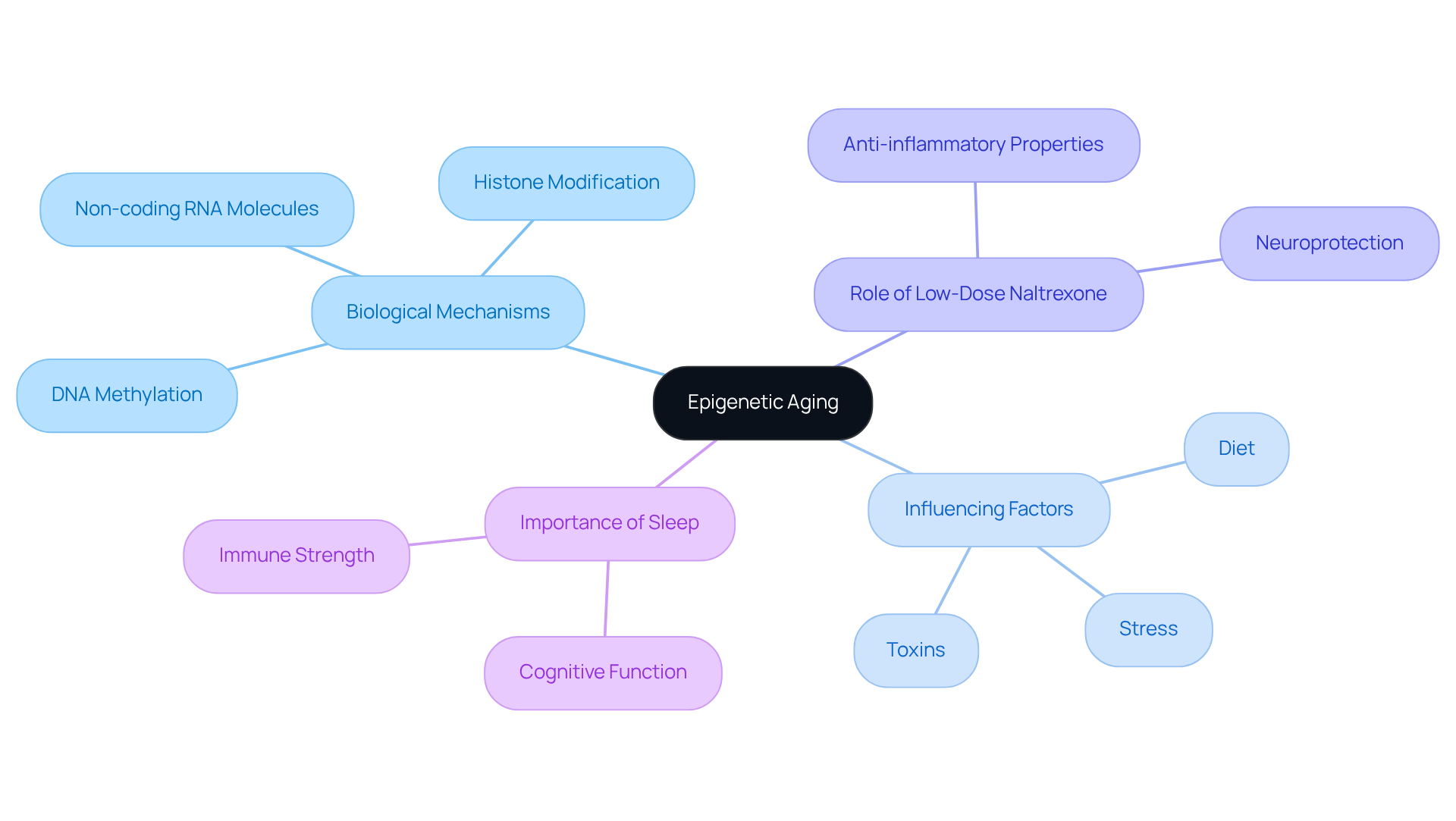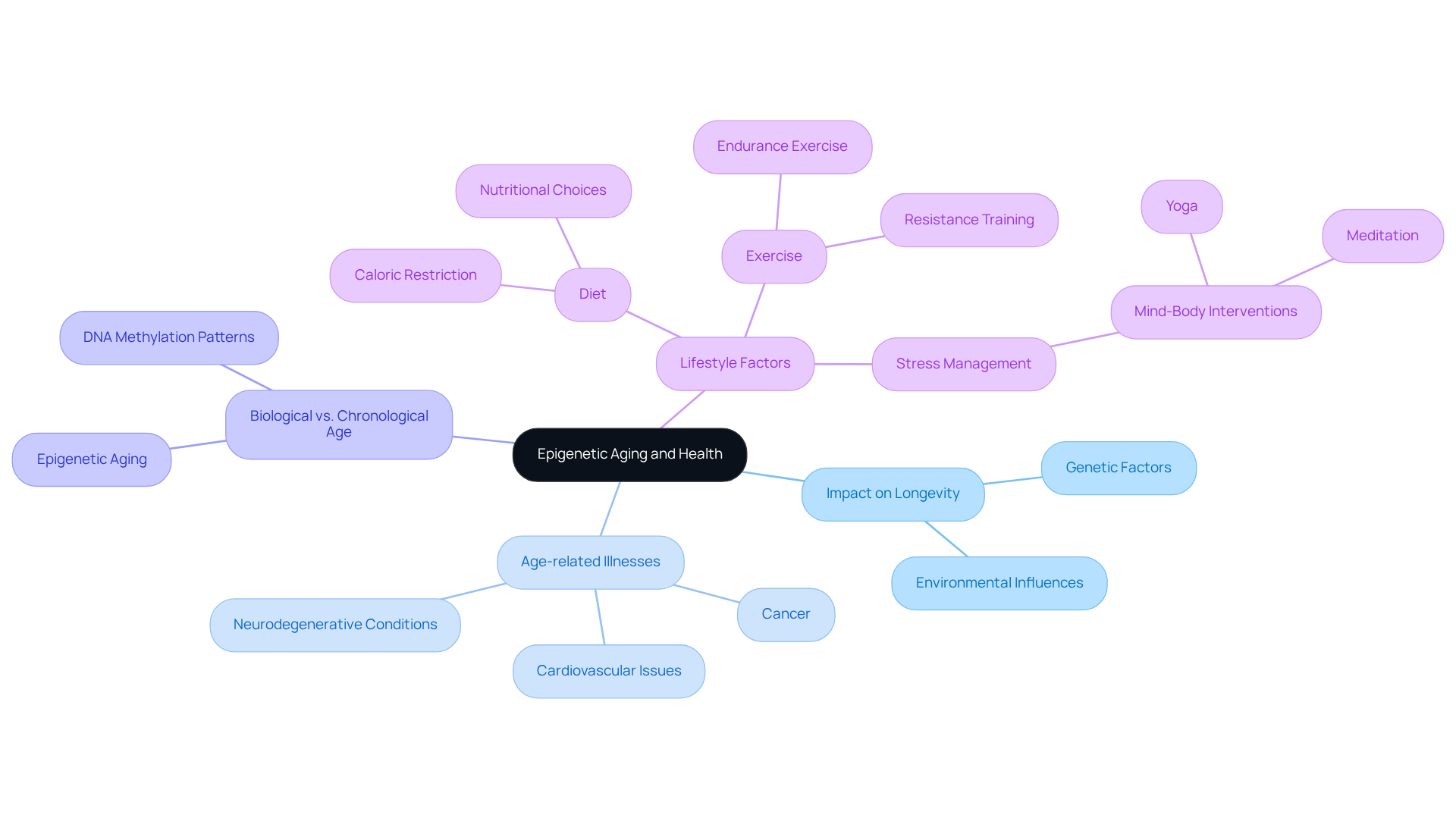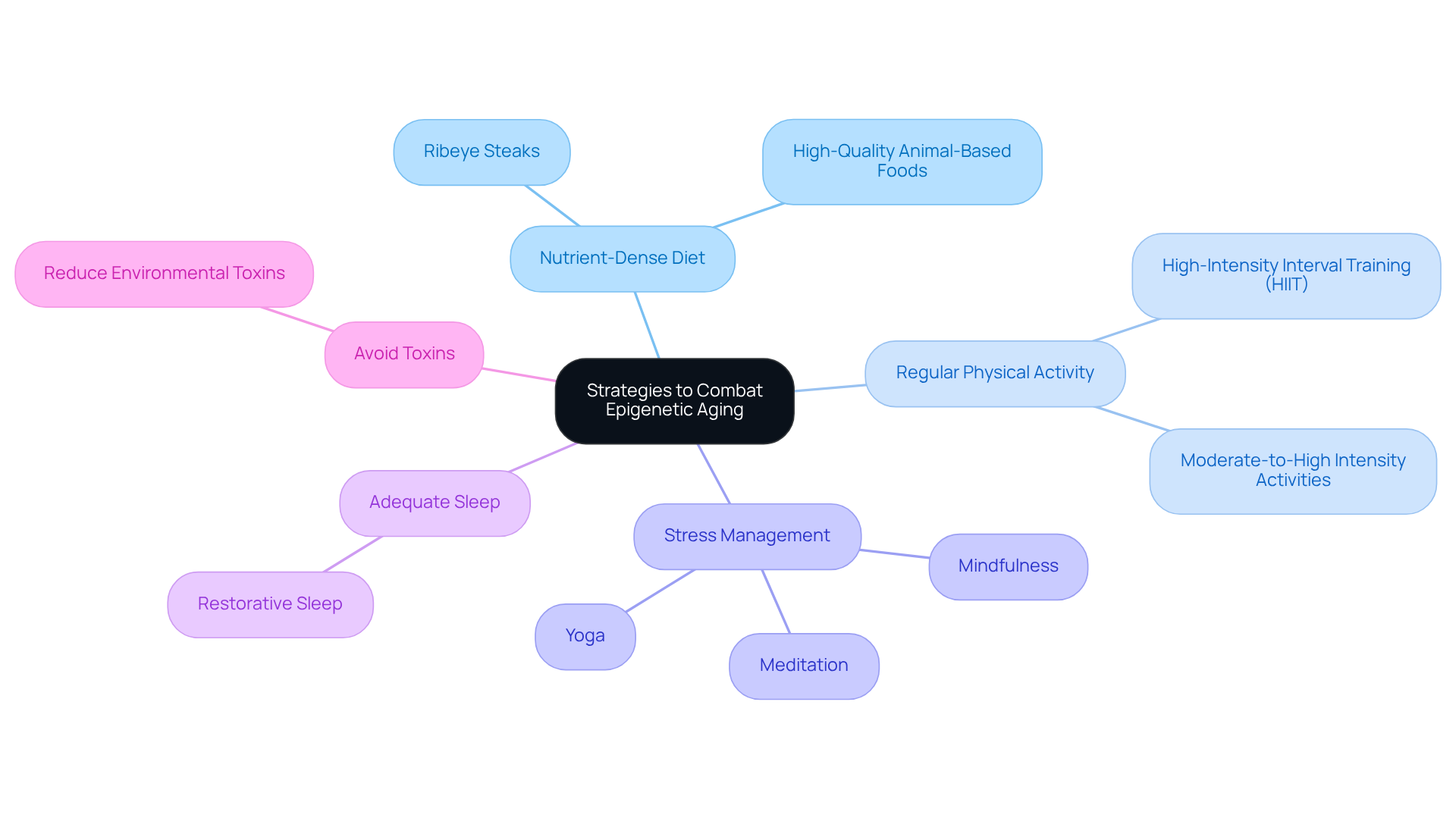Understand Epigenetic Aging and Its Impact on Health
Overview
Epigenetic aging involves changes in gene expression that are influenced by environmental factors and lifestyle choices, significantly impacting health and longevity. This article emphasizes that lifestyle modifications—such as adopting a nutrient-dense diet, engaging in regular exercise, managing stress effectively, and ensuring adequate sleep—can mitigate the effects of epigenetic aging. By improving cellular health, these changes may also reduce the risk of age-related diseases.
Furthermore, consider how these lifestyle choices can enhance your overall well-being. Making informed decisions about diet and activity levels not only supports your genetic health but also contributes to a longer, healthier life. Explore these modifications and take actionable steps toward improving your health today.
Introduction
Understanding the intricate dance between genetics and environment reveals a fascinating aspect of aging: epigenetic aging. This process involves changes in gene expression that are influenced by lifestyle choices, diet, and environmental factors, ultimately shaping health outcomes and longevity. As research uncovers the profound implications of these modifications, a pressing question emerges: What proactive steps can individuals take to influence their biological age and enhance their overall well-being?
Furthermore, exploring the interplay between our choices and biological aging opens up a world of possibilities for improving health. By recognizing the role of factors such as nutrition and physical activity, we can begin to understand how these elements contribute to our longevity. In addition, the emerging research in this field emphasizes the importance of making informed decisions that not only impact our present but also our future health.
As a result, it becomes crucial for individuals to consider actionable steps they can take. Engaging with this knowledge empowers us to take charge of our health journey, fostering a sense of agency over our biological age. By prioritizing healthy habits, we can potentially enhance our well-being and longevity.
Define Epigenetic Aging and Its Biological Mechanisms
Epigenetic aging encompasses the changes in gene expression that occur as we age, shaped by environmental factors, lifestyle choices, and diet. Unlike genetic mutations, which alter the DNA sequence, epigenetic modifications adjust how genes are activated or silenced without changing the underlying DNA. Key biological mechanisms involved include:
- DNA methylation
- Histone modification
- Non-coding RNA molecules
Various factors such as diet, stress, and exposure to toxins can affect these processes, leading to alterations in cellular function that contribute to epigenetic aging.
Recent research underscores the significance of Low-Dose Naltrexone (LDN) in this context, particularly its role in modulating the opioid growth factor receptor pathway, which may aid in neuroprotection. The anti-inflammatory properties of LDN are particularly important, given that chronic inflammation is a recognized contributor to the development and progression of neurodegenerative diseases. By reducing neuroinflammation, LDN not only assists in symptom management but also improves cognitive function, which is vital for maintaining health over time.
Moreover, the importance of sleep in preserving cognitive function and overall well-being cannot be overstated; quality sleep is essential for optimal brain function and immune strength. Understanding these mechanisms is crucial for developing strategies to mitigate their impacts on epigenetic aging and promote healthy longevity.

Explore the Impact of Epigenetic Aging on Health and Longevity
Changes in gene expression significantly affect health and longevity. Research has established a strong link between these modifications and various age-related illnesses, including cancer, cardiovascular issues, and neurodegenerative conditions. Notably, DNA methylation patterns serve as markers of biological age, which are important indicators of epigenetic aging that can differ from chronological age. This indicates that some individuals may experience epigenetic aging, which can be either hastened or postponed relative to their actual age.
Lifestyle factors, such as diet, exercise, and stress management, play a crucial role in influencing epigenetic aging and related genetic markers. For instance, caloric limitation has been shown to slow biological deterioration and reduce the occurrence of age-associated illnesses. Additionally, consistent physical exercise positively impacts DNA methylation and histone alterations, effectively reversing modifications associated with epigenetic aging.
By understanding the complex relationship between biological development and well-being, individuals can make informed lifestyle choices that may enhance their longevity and overall quality of life. What steps can you take today to influence your biological age positively?

Implement Strategies to Combat Epigenetic Aging
To effectively combat biological deterioration, individuals can adopt various lifestyle and nutritional strategies aimed at enhancing cellular health and longevity. Here are some key approaches:
-
Nutrient-Dense Diet: Prioritize a diet rich in high-quality animal-based foods, including lean meats, fish, and organ meats. For instance, ribeye steaks are an excellent choice due to their rich nutrient profile. To prepare ribeye steaks, allow them to reach room temperature before cooking, pat them dry, season with salt and pepper, and sear in a hot cast-iron skillet with olive oil. Basting with grass-fed butter not only enhances flavor but also boosts nutritional value. This nutrient-rich method supports cellular wellness and positively influences gene expression, which is crucial for addressing issues related to epigenetic aging.
-
Regular Physical Activity: Engage in consistent exercise, particularly moderate-to-high intensity activities, which have been shown to positively affect genetic markers. Research indicates that increased physical activity correlates with slower rates of epigenetic aging over time, primarily due to improvements in cardiovascular fitness and immune function. High-Intensity Interval Training (HIIT), for example, has demonstrated significant benefits, including enhanced telomere length and improved health biomarkers.
-
Stress Management: Implement stress-reduction techniques such as mindfulness, meditation, or yoga. Chronic stress can adversely affect genetic development and promote epigenetic aging, making it essential to manage stress effectively to maintain a healthy genetic profile.
-
Adequate Sleep: Ensure quality rest, as restorative sleep is vital for sustaining healthy genetic profiles. Sleep plays a pivotal role in cellular repair and regeneration, both of which are essential for countering the effects of epigenetic aging.
-
Avoid Toxins: Reduce exposure to environmental toxins and pollutants, which can lead to detrimental genetic modifications. A clean environment fosters improved well-being and helps maintain genetic integrity, thereby influencing epigenetic aging.
By incorporating these strategies into daily routines, including the preparation of nutrient-dense meals like ribeye steaks, individuals can potentially enhance their overall health and longevity while mitigating the effects of epigenetic aging.

Conclusion
Epigenetic aging serves as a pivotal intersection between genetics and lifestyle, illustrating how environmental factors and personal choices can shape gene expression throughout the aging process. This dynamic interplay underscores the necessity of comprehending not only the biological mechanisms underlying aging but also the proactive strategies individuals can adopt to foster healthier aging.
Key insights from this discussion reveal that epigenetic modifications, including DNA methylation and histone alterations, have significant implications for health and longevity. These changes are associated with various age-related diseases, and the awareness that biological age may differ from chronological age emphasizes the potential for lifestyle interventions to alter this trajectory. By adopting a nutrient-dense diet, engaging in regular physical activity, managing stress, ensuring adequate sleep, and minimizing toxin exposure, individuals can take actionable steps that profoundly influence epigenetic aging.
Ultimately, the path to healthier aging transcends mere scientific understanding of epigenetic changes; it also empowers individuals to make informed lifestyle choices that enhance their well-being. Recognizing the impact of epigenetics on health enables proactive measures to optimize biological age and improve quality of life. By embracing these strategies, individuals can cultivate a more vibrant and fulfilling life, demonstrating that it is never too late to implement positive changes for a healthier future.
Frequently Asked Questions
What is epigenetic aging?
Epigenetic aging refers to the changes in gene expression that occur as we age, influenced by environmental factors, lifestyle choices, and diet. It involves modifications that adjust how genes are activated or silenced without altering the DNA sequence itself.
What are the key biological mechanisms involved in epigenetic aging?
The key biological mechanisms involved in epigenetic aging include DNA methylation, histone modification, and non-coding RNA molecules.
What factors can affect epigenetic aging?
Factors that can affect epigenetic aging include diet, stress, and exposure to toxins, which can lead to alterations in cellular function.
How does Low-Dose Naltrexone (LDN) relate to epigenetic aging?
Recent research highlights the role of Low-Dose Naltrexone (LDN) in modulating the opioid growth factor receptor pathway, which may aid in neuroprotection and reduce neuroinflammation, contributing to improved cognitive function and symptom management.
Why is sleep important in the context of epigenetic aging?
Quality sleep is essential for optimal brain function and immune strength, playing a crucial role in preserving cognitive function and overall well-being as we age.
How can understanding epigenetic aging mechanisms help us?
Understanding the mechanisms of epigenetic aging is crucial for developing strategies to mitigate its impacts and promote healthy longevity.






